CSTEP and STEP are programs that provide support to New York high school and college students from underrepresented backgrounds, including academic support and counseling, scholarships, and research opportunities. (CSTEP is for undergraduates, while STEP is for middle and high school students.)
Fetal Development, Eel Health, and Neurodegenerative Disease
Students in Fordham’s programs presented their research to judges at the programs’ regional student conferences and were recognized for the quality of their projects.
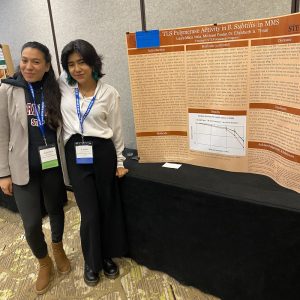
Three CSTEP students, who are all undergraduates at Fordham College at Rose Hill, were honored at the 29th annual CSTEP statewide student conference on April 16 in Lake George, New York: Daphne Buitron, a May graduate who earned her bachelor’s degree in sociology, won honorable mention in the natural sciences category for her project “Influence of COVID-19 Infection during Pregnancy on Infant Neurodevelopment,” conducted through a summer scholars program at the Virginia Commonwealth University School of Medicine; Latif Diaoune, a rising senior who studies general science and sociology, won 4th place in the natural sciences category for his project “H(eel)ing Our Rivers: An Assessment of River Health and a Survey of the American Eel,” conducted through Project TRUE; and Isaac Mullings, a rising senior who studies psychology on the pre-med track, won third place in the health sciences category for his project “Amyotrophic Lateral Sclerosis and Biomarkers of Disease Progression,” conducted through Columbia University’s PrIMER program.
In addition, Laura Maca Vela, a high school senior at West End Secondary School in Manhattan, won third place in the biological sciences category for her research project “TLS Polymerase Activity in B. Subtilis in MMS” at the 23rd annual STEP statewide student conference in Albany on March 26. She conducted her research with Elizabeth Thrall, Ph.D., an assistant chemistry professor at Fordham.
A Bronx Native Studies the Bronx River
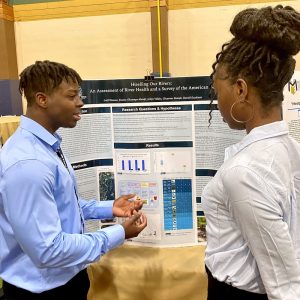
Diaoune, a Bronx native and commuter student, studied the Bronx River, the only freshwater river in New York City. In a project conducted with Project TRUE, he researched the impact of macroplastics and other pollutants on the American eel, a keystone species that lives in the Bronx River.
“We saw the result of accelerated plastic production combined with [poor]waste disposal management, which is ultimately causing the oceans and rivers to suffer,” said Diaoune, who caught and measured local eels and plastics. “These consequences are felt by marine species like the American eel.”
The purpose of his project was to get his hands wet with research, said Diaoune, a pre-med student who is considering becoming a surgeon. He learned how to run his own experiment and mentor younger scientists. (Diaoune supervised several research assistants who are high school students in the Bronx.)
Diaoune has presented his research before, at a Project TRUE symposium held at the American Museum of Natural History, but he said the CSTEP symposium was different.
“I realized how big CSTEP really is,” said Diaoune. “It’s a huge community.”
]]>From there, he commuted for two hours. Each way.
“That is very difficult to do, if you do that every day,” especially in light of the “pretty intense” workload that comes with being an English major and biology minor on the pre-health track, said Feliz Varona, a senior.
Then he found out about the Fordham Housing Fund, devoted to helping students overcome the financial barriers to living on campus. With support from the fund, Feliz Varona moved onto campus in junior year and today lives in O’Hare Hall. The move enabled him to take leadership roles in clubs including the Black Student Alliance, for which he is now vice president, and the Minority Association of Pre-Health Students, of which he is president.
“[When] you have those extra four hours, your life changes completely,” he said. “The difference was way bigger than what I anticipated. And honestly, it’s just a blessing that I am thankful for every day.”
This year, the Fordham Housing Fund is supporting Feliz Varona and eight other students who came to Fordham via its Collegiate Science and Technology Entry Program, or CSTEP, a New York state program that helps students from underrepresented groups enter science-related fields and the licensed professions.
The fund has been focused on CSTEP students since it was established in 2011 by Brian and Kathy MacLean, both FCRH ’75, who sought to help students who would most benefit from living on campus. Recipients had often struggled with long commutes or other challenges such as crowded and distracting living situations that made it hard to focus on their studies, hurting their grades.
The MacLeans, two of the University’s generous donors, made further major gifts to build the fund’s endowment after meeting recipients and hearing how they had benefited from it. “The stories from the CSTEP students that get the [funding awards]are so amazing,” said Brian MacLean, a former Fordham University trustee and current trustee fellow. Kathy MacLean, a current member of the Board of Trustees, noted one benefit in particular: “When we talked to the students, we were surprised that for many of them, the number one benefit they most appreciated was being able to sleep more. This positively impacted their grades and general well-being.”
The MacLeans have been the primary donors to the Fordham Housing Fund but left their names out of its title in order to encourage others to support it as well. In adding to the fund, they also sought to enhance diversity among on-campus residents—a goal that dovetails with those of the University’s $350 million fundraising campaign, Cura Personalis | For Every Fordham Student, which the MacLeans helped to advance with a new gift to the housing fund this year.
A Transformative Experience
Thirty to 40 students apply every year for funding awards, which cover housing and a basic meal plan, said Michael Molina, Fordham’s CSTEP and STEP director. Students are selected based on grade point average, an essay, and an interview focusing on how they would get more involved and contribute to the on-campus community if they could live in a residence hall.
For those selected, the experience of living on campus can be transformative, Molina said—especially if they would otherwise be living with multiple family members and wanting for privacy.
As a student, “there are those times you need to be around people, to be around your peers and your friends and your classmates, then there are those times that you need to have some time to yourself,” he said.
The number of CSTEP students helped by the fund has grown from two in the first year to nine today, Molina said. For this year’s recipients, the fund has made all the difference, helping them realize their ambitions for their time at Fordham.
A 180-Degree Change
Yu Jin In, a junior majoring in integrative neuroscience, had been waking up as early as 5:30 a.m. to commute to Rose Hill from her family’s home in Queens—taking two buses, occasionally having to run from one to catch the other, to arrive in time for 8 a.m. classes.
Now, thanks to her housing fund award, she lives in the Martyrs’ Court residence halls and her Fordham experience has “changed 180 degrees”—she’s better able to make friends, take night classes, and use her evenings for unbroken studying or other engagements. “I could finally say ‘yes’ to dinner [with]people,” she said.
Things also changed for Fawziah Fariha, a senior on the pre-health track who is double-majoring in psychology and theology, when she no longer had a long commute to and from her Bronx home.
With the extra time and flexibility, she was better able to get more involved with student clubs and push beyond her comfort zone. “I’m able to really lead,” said Fariha, who is a secretary in the Muslim Student Association; director in Fordham University South Asian Entity, or FUSE; president of the Laennec Society, a pre-health students’ club; and co-founder of the new Bengali Student Association. Through leadership, she said, “you learn so much about yourself.”
Some students faced long commutes even if they were relatively close to Rose Hill. For Giovanni Barreiro, a senior engineering physics major, it could take an hour and a half from the Throgs Neck section of the Bronx. For Chealsy Garcia, a junior general science major also in the pre-health program, it could take an hour to get to and from Washington Heights. Living on campus, Garcia is able to spend more time with various activities, like being a mentor with Mentoring Latinas, and is in the process of joining Fordham’s EMS service, known as FUEMS.
Daphne Buitron, a pre-health senior majoring in sociology and minoring in biology, enjoys being able to meet up with other students for studying, as well as having time for other things like joining the dance club, which has late meetings.
“This gave me the chance to do something for myself, but also continue with my academics,” she said. “I could do what I want instead of what I need and then leave.”
‘Somebody Looking Out for You’
Maria Del Sol Estrada, a senior double-majoring in political science and Spanish language and literature and applying to law school, originally applied for the on-campus housing out of concern about bringing home COVID-19 to her family members—including her grandmother—with whom she was living in Manhattan.
“It affects you subconsciously,” she said. “You think about things more. I literally think I washed my hands every single time I would touch something. I didn’t take my mask off for a really long time.”
Isaac Mullings, a junior psychology major on the pre-health track, said it’s been interesting to be able to pick up food on campus without opening his wallet; he can simply use his meal plan card.
He said the housing award has encouraged him to do well. “I think it’s served [as]a point of motivation—‘Okay, there’s somebody looking out for you, so just try your best in class today,’” he said.
Make a gift to the Fordham Housing Fund here.
To inquire about giving to any area of the University, please contact Michael Boyd, senior associate vice president for development and university relations, at 212-636-6525 or [email protected]. Learn more about Cura Personalis | For Every Fordham Student, a campaign to reinvest in every aspect of the Fordham student experience.
]]>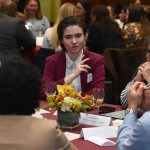
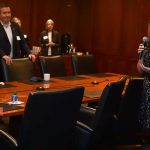
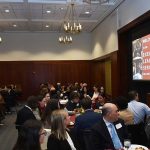
 More than 100 Fordham alumni and students gathered at the Lincoln Center campus on Nov. 16 for the annual President’s Council Executive Leadership Series Mentoring Event—an opportunity for young alumni and members of the council to share insights and advice with seniors and recent graduates from across Fordham’s undergraduate colleges. The event included a reception and roundtable discussions.
More than 100 Fordham alumni and students gathered at the Lincoln Center campus on Nov. 16 for the annual President’s Council Executive Leadership Series Mentoring Event—an opportunity for young alumni and members of the council to share insights and advice with seniors and recent graduates from across Fordham’s undergraduate colleges. The event included a reception and roundtable discussions.
Terry Begley, GABELLI ’86, the CEO of corporate banking at PNC Financial Services Group, kicked off the evening. He shared that as the new chair of the council, he’s excited to harness its passion for the University to help Fordham’s new president, Tania Tetlow, with “what she’s trying to accomplish.”
Fordham’s ‘Knights of the Round Table’
The reception served as the first official opportunity for Tetlow to meet the council, a group of successful professionals and philanthropists committed to mentoring Fordham’s future leaders, funding key initiatives, and raising the University’s profile.
“I am so excited to have my own council!” she told them at a reception prior to the mentoring event, which was held in the Lowenstein Center’s 12th-Floor Lounge. “I’ll think of you as Fordham’s Knights of the Round Table: You bring your wisdom, your contribution, your expertise—so much—to Fordham and our students.”
Tetlow said she loves hearing about the ways council members not only “help with the kind of donations that pay forward opportunity” but also engage with “our students quite directly—mentoring them, giving speeches, doing so much for the school.” She added that she’s “eager” to take in their advice and work with them to continue to enhance the Fordham experience for students.
Forge New Connections
Margot Reid, GABELLI ’21, special events and professional development chair of Fordham’s Young Alumni Committee, opened the roundtable discussion portion of the evening by welcoming alumni and parents “back here, back home, to Fordham.” She encouraged the students and recent graduates to really “make the most of this unique opportunity to connect with … the Fordham family” in the room, a group that included graduates from class years spanning five decades.
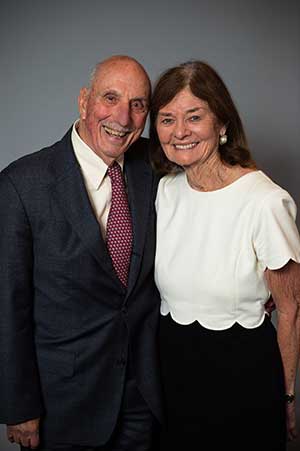
At 10 tables, each one featuring at least two mentors, attendees shared their stories—from what brought them to Fordham and who in the Fordham community has had the biggest impact on them to how to navigate the workforce while staying true to their values along the way. Guided by discussion prompts, they also delved into how Fordham’s global network of more than 200,000 alumni can help.
Garismar Ramirez, a Fordham College at Rose Hill senior studying neuroscience, asked the mentors at her table how they transitioned to the workforce after college, noting that she feels it would be a big jump to go from worrying about GPA and test scores to performing well every day on the job.
Thomas E. Kelly III, PAR ’11, ’13, said that he did it by learning to be comfortable with ambiguity and trusting in his ability to do a “good job.”
“Don’t be afraid. Don’t be anxious,” he said, adding they should aim to perform with as much excellence as they can.
Kelly, a member of the President’s Council, also encouraged students and recent graduates to use the resources Fordham offers, through the alumni relations office, the Career Center, and the Office of Counseling and Psychological Services, to help overcome any nervousness or anxiety they might have about interviewing and networking.
Trust the Process
Guthrie Garvin, FCRH ’99, a managing director at the real estate and investment firm JLL and member of the President’s Council, said that it’s important not to put too much pressure on yourself to find “the job” you’ll have for the rest of your life.
“I’ve been doing the same thing for 18 years, but it was a pretty circuitous path before that,” said Guthrie, who spent some time in education and sales before turning to real estate. “Find what you think you’re passionate about and jump in, but don’t be afraid to pivot if it turns out that there’s another path that seems more exciting. It’s part of the process.”
Speaking of process, Errol Pierre, GABELLI ’05, senior vice president of state programs at Healthfirst and member of the President’s Council, told the students that internships could help them determine what they’re most passionate about. Thanks to a series of three internships he completed as an undergraduate, he learned what he didn’t like. And “if you can align passion and profession, the sky’s the limit,” he said.
Remember You Belong
Halley Rodriguez, a Fordham College at Lincoln Center senior and a member of Fordham’s Collegiate Science and Technology Entry Program (CSTEP), said she was curious about how to combat imposter syndrome.
In response, Garvin encouraged each of the students at the table to “be confident in yourself and where you should be,” to resist the temptation to “run from what’s a little uncomfortable,” and to remember always that they will bring value to the organization that hires them.
“Constantly tell yourself, ‘I’m supposed to be here,’” Pierre said. “The time it takes to be in your head [worrying]takes you away from performing.”
]]>Harris played numerous leadership roles—in ASILI, the Black student alliance; in Fordham’s Collegiate Science and Technology Entry Program, or CSTEP; and at Loschert Hall, where he served as a resident assistant. He served on the University’s undergraduate advising task force, and he was part of a team working with philosophy professors to add diverse voices to the department’s curriculum as part of a Teaching Race Across the Curriculum grant.
He was a leader among his friends, too, always ready to help them or dispense a wise word when it was needed.
“There wasn’t a moment when Vincent wasn’t a big brother to us,” said one of his friends, Anita Adu Manu, a fellow Fordham College at Rose Hill senior. “He taught me so much, and we’re all going to miss him.”
Harris was serious and hard-working, and always got things done on time, but he could also be “a goofy guy,” and fun-loving, said Rashain Adams Jr., president of ASILI.
“He was extremely authentic, and one of a kind,” Adams said.
A CSTEP Scholar
A native of Orange County, New York, Harris graduated from Regis High School in Manhattan in 2018 before coming to Fordham and joining CSTEP, a statewide program that prepares college students from underrepresented backgrounds for careers related to science, technology, engineering, and mathematics (STEM), or careers in healthcare or in licensed fields. Harris was interested in law school, said Renaldo Alba, associate director of the Fordham CSTEP program and its partner program for younger students, STEP.
Harris was a Dean’s List student double-majoring in philosophy and German language and literature, said Lisa Gill, Ph.D., assistant dean for the senior class at Fordham College at Rose Hill. Harris was also pursuing a commission in the U.S. Marine Corps through its Platoon Leaders Class and was set to become a 2nd lieutenant on June 10.
He was a member of the Caribbean and African Students Association, among his other roles, and he was described as someone who often brought different campus groups together for discussions.
“Vincent was a talented, warm-hearted, and highly engaged member of our campus community who gave of himself in so many ways,” said Joseph M. McShane, S.J., president of Fordham. “Words cannot fully convey the tragedy of losing someone so young and so full of promise.”
Harris had received the C. David Ferguson CSTEP Scholar Award on May 5 in a ceremony at the Rose Hill campus. He had served in CSTEP’s companion STEP program for junior- and high-school students by teaching a seminar course—Philosophy and the Black Experience—to STEP students on Saturdays last fall at Rose Hill, Alba said.
He was also a tutor/peer counselor for STEP students enrolled in math, earth sciences, and rhetoric enrichment courses taught on campus by area high school teachers, he said, serving as a role model and helping to demystify the college experience and make it more accessible. In addition, Harris was part of a trio of CSTEP students who visited area schools on weekdays for conversations that supported a college access and student life curriculum, Alba said.
Harris had served as treasurer of ASILI and was vice president of the student organization this semester, Adams said. Harris played a significant role in arranging the virtual Fordham event in February featuring prominent author and activist Cornel West, Ph.D. “Without him, it wouldn’t have happened,” Adams said.
Geraldo De La Cruz, a senior in the Gabelli School of Business and fellow ASILI board member, said Harris loved to be active, and was often in the gym. He was passionate about his opinions, which were always well-reasoned, De La Cruz said.
Full of Energy
Harris’s fellow Loschert Hall resident assistant and ASILI board member, Sydni Britton, said “he very much cared about whatever he’s talking about, whatever he’s doing, whatever he’s involved in.”
He showed fortitude in his well-grounded perspectives on societal and political issues, “and that’s an admirable quality, especially if someone wants to be a leader,” she said. He did, however, show he could change his views based on discussion and new information—“a very difficult balance that many people can’t do,” said Britton, also a Fordham College at Rose Hill senior.
She noted his love for the outdoors, which came out during a hiking trip in the New York outskirts that they organized for Loschert Hall students last fall. “It was really cool to see how enthusiastic he was with the students about the outdoors.”
She described him as someone who wanted to make the most of every day. “He was definitely always about being in service of others,” she said.
Anita Adu Manu described him as humble, never wanting to be rewarded for anything, and “incredibly smart.”
She said that she and his other friends were going to try to finish out the semester showing Harris’s same joyful spirit.
“‘There’s nothing in life that’s out of reach’—that’s something Vincent always told us,” she said.
A memorial Mass for Vincent Harris will be held in the University Church at Rose Hill on Friday, May 13, at 12:15 p.m.
]]>





 Graduating seniors in Fordham’s Collegiate Science and Technology Entry Program celebrated their accomplishments at the annual CSTEP Senior Farewell and Awards Ceremony on May 5.
Graduating seniors in Fordham’s Collegiate Science and Technology Entry Program celebrated their accomplishments at the annual CSTEP Senior Farewell and Awards Ceremony on May 5.
“You have achieved great things, and in the heart of the pandemic, you have managed to keep this community alive,” Joseph M. McShane, S.J., president of Fordham, said to the CSTEP students and staff. “This is a program that is a community. You all watch out for one another—and you inspire us.”
Fordham CSTEP is a statewide program that supports minority and economically disadvantaged students through mentorship and academic and career-oriented resources. The program prepares students for professions in areas where they are underrepresented, including STEM, health, and other licensed fields, and provides a “transformational, educational experience to future professionals and leaders,” said Renaldo D. Alba, associate director of the CSTEP and STEP programs.
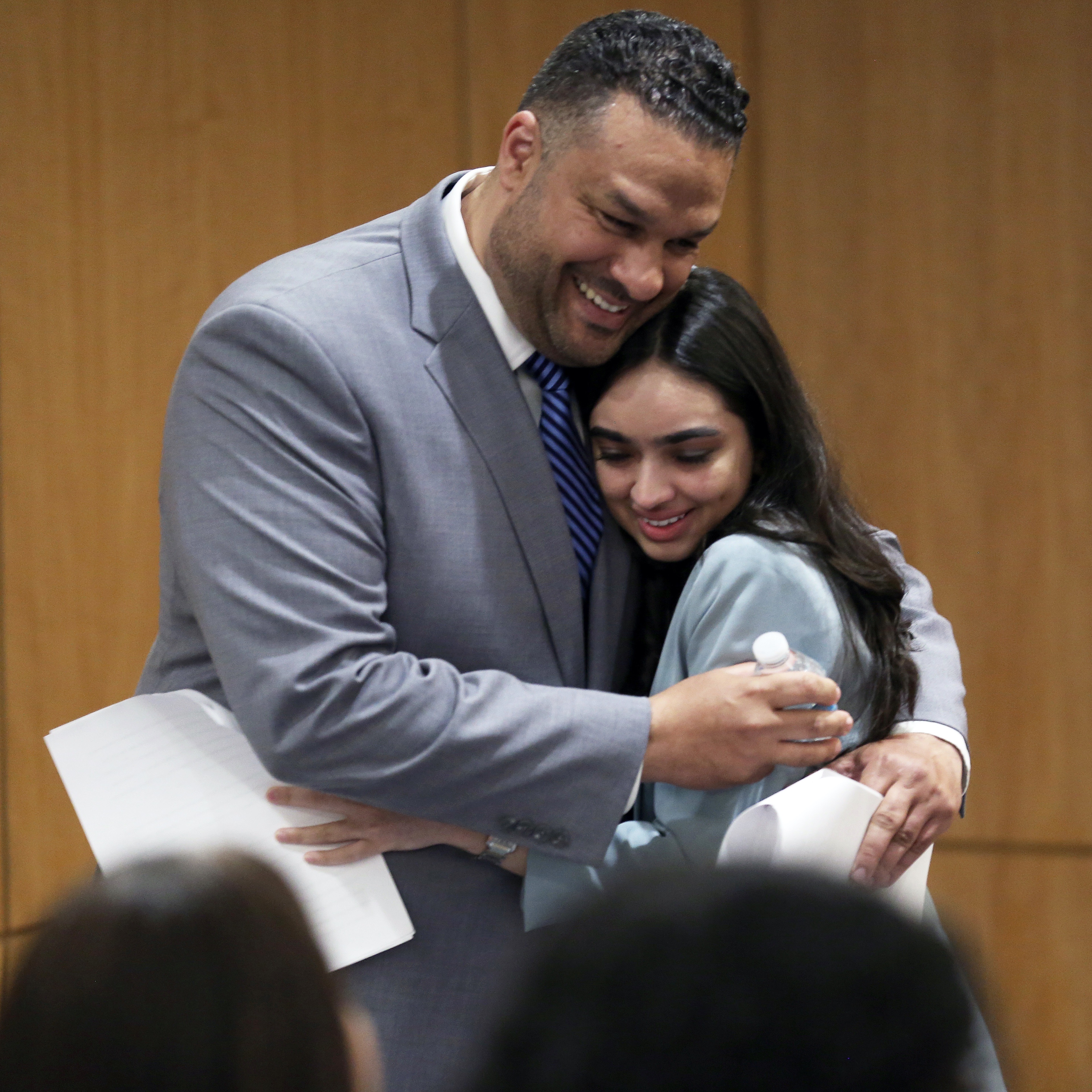
This spring, 73 CSTEP students will receive their diplomas, said Alba. After graduation, they will pursue different opportunities across the country. Among them are four students heading to dental, medical, or law school; one student attending a Ph.D. psychology program; 12 students pursuing master’s degrees in various disciplines; and one student participating in the City Year program, he said.
In addition to recognizing graduating seniors, the ceremony celebrated other CSTEP scholars, including more than 100 students who achieved a cumulative GPA of 3.5 or higher and about 50 students who served as tutors and peer counselors in the pre-college STEP Program for middle and high schoolers.
Rafael Zapata, chief diversity officer, special assistant to the president for diversity, and associate vice president for academic affairs, was recognized with CSTEP’s Outstanding Service Award, which is presented to faculty, administrators, and partners who have provided exceptional service to CSTEP students. In his acceptance speech, Zapata lauded Michael A. Molina, director of the CSTEP and STEP programs, for leading the program over the past 35 years. (Molina was unable to physically attend the event because he is recovering from a medical procedure, but he joined via Zoom.)
“No other office at Fordham better serves the needs of first-generation college students, low-income students, and students of color, with more dignity, understanding, love, support—and challenge—than CSTEP,” Zapata said.
Zapata, a native New Yorker who grew up in public housing and became the first in his family to graduate from college, said he wished he had a community like CSTEP when he was younger.
“I had a lot of loving and caring teachers. But I never had anyone who I could talk to about my life … I didn’t have this community. I wish I did,” Zapata said. “There’s so much pressure on you to sound differently, to act differently, to even walk differently. And for that, I’m grateful to remind you that I can be [myself], and you can be [yourself here].”
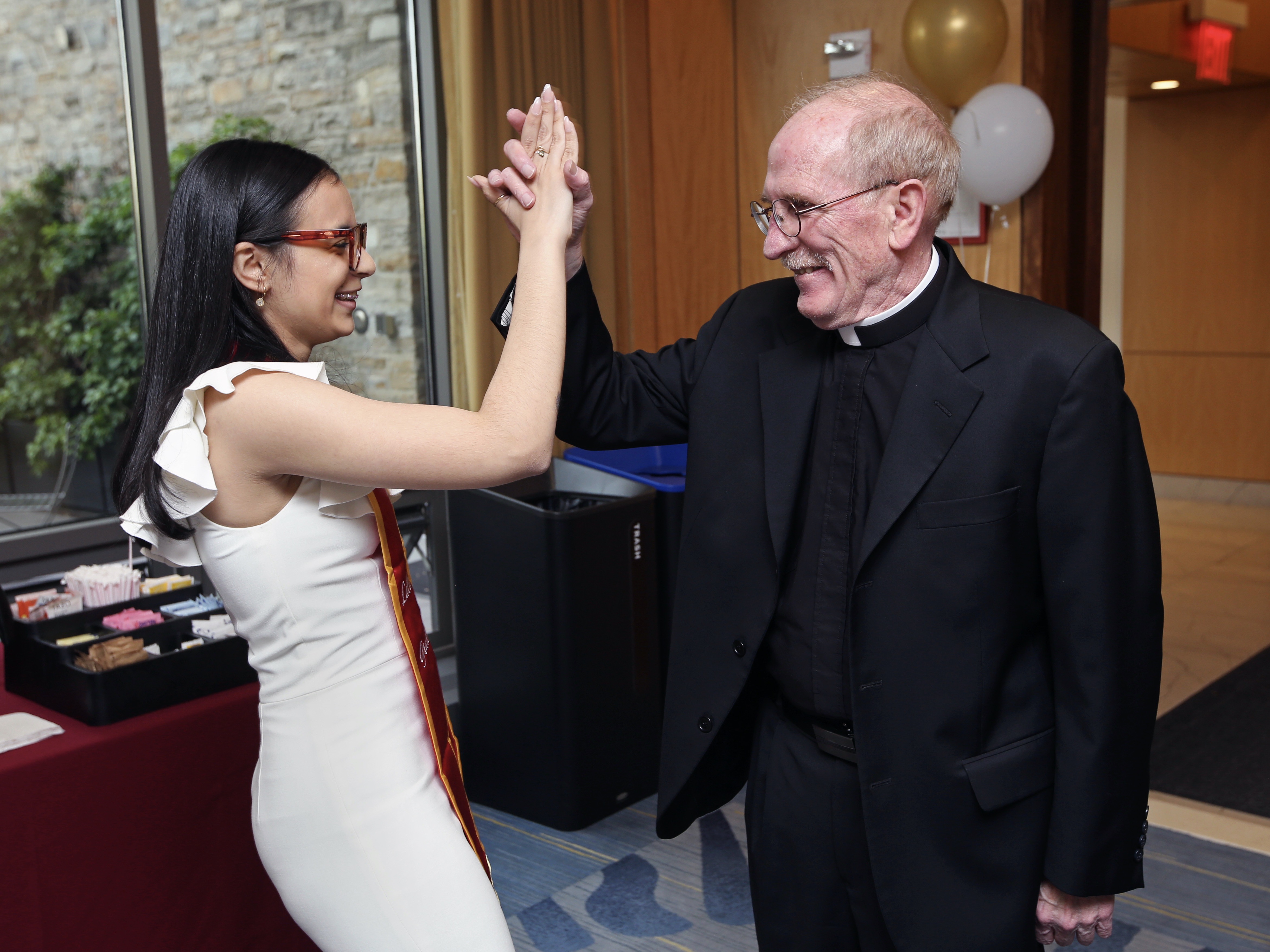
In heartfelt speeches, students described their own experiences in the program.
“CSTEP has been the best part of my undergrad experience and it has helped me grow socially, personally, and academically,” said Anusha Imran, FCLC ’22, a first-generation college student and aspiring physician who will receive CSTEP’s highest award at Fordham College at Lincoln Center’s award ceremony for graduating seniors. “I found a tight-knit community and met students who have similar stories, which only made me and them more resilient and fierce in the advocacy of our own education.”
In his keynote speech, CSTEP alumnus Braulio Carrero, FCRH ’04, senior counsel at Cityblock Health—a company that provides medical services to marginalized populations—congratulated the seniors and offered them advice for life after graduation.
“In my 20s, my purpose was trying to find my purpose,” Carrero said. “Some of you are very determined in the path that you want, and others aren’t. But at the end of the day … always remember what matters and why you’re doing what you’re doing.”
(Vincent Harris, FCRH ’22, who was scheduled to receive CSTEP’s highest award at Encaenia—Fordham College at Rose Hill’s award ceremony for graduating seniors—died suddenly on May 10. The University published an obituary and held a memorial Mass for Harris at the University Church at Rose Hill on May 13.)

Fordham’s Collegiate Science Technology and Entry Program (CSTEP), a program that prepares minority and economically disadvantaged students for careers in fields in which they are underrepresented, has helped her find an academic and social home on campus.
So when administrators asked her to participate in early February in a meeting with New York state legislators who will determine how much funding the program receives from the state, she jumped at the chance.
“Anything they need, I’m like, ‘Yeah, I’ll do it,’” said Rosario, a psychology major who commutes to campus from the Riverdale neighborhood in the Bronx.
“I feel like I owe them everything.”
Rosario described Fordham’s CSTEP office as a locus of serendipity, part of her daily routine, where she connects with students she might not otherwise meet and chats with them about internships and research opportunities, among other topics.
“In a cliché way, we are like a community. We’re there for each other, no questions asked,” she said.
An Annual New York State Tradition
Fordham has participated in Advocacy Day, an annual event held over two days in Albany, for the better part of two decades, said Lesley Massiah-Arthur, associate vice president and special assistant to the president for government relations. In the past, that meant busing 40 or so students to the capital; since 2021, however, the meetings have been held via Zoom. On Feb 1 and 2, 60 Fordham students took part in 45 meetings, including one attended by New York State Senate Majority Leader Andrea Stewart Cousins.
This year, Fordham requested an increase of $1.4 million for student aid and academic pipeline programs. For Fordham CSTEP, this would increase state funding to $17.3 million; for STEP, which serves junior high and high school students, it would increase state funding to $22.8 million. Fordham is currently home to 300 CSTEP students enrolled at Rose Hill, and 590 STEP students are enrolled at both the Rose Hill and Lincoln Center campuses.
The request also includes funding for the Higher Education Opportunity Program (HEOP), the Liberty Partnership Program (LLP), Direct Institutional Aid (Bundy Aid), and the Enhancing Supports and Services for Students with Disabilities for Postsecondary Success Program (SWDPS). Students and staff from HEOP and LLP also participated in the meetings. There are 394 HEOP students attending the Lincoln Center and Rose Hill Campus programs.
Massiah-Arthur said students are a crucial part of the funding process.
“When students are involved, there’s an entirely new energy that goes into the advocacy process. It’s one thing for me or the program director to talk about the importance of these programs. It’s another thing when students and parents participate, and elected officials can hear firsthand the importance of state funding,” she said.
In years past, they’ve had to make a case against cuts to STEP and CSTEP, which receive 40% of their funding from Fordham, but Massiah-Arthur said the good news is that lawmakers now understand the value of programs such as CSTEP, so they’re no longer routinely put on the chopping block. The decision on funding levels will be revealed in the final state budget in April.
“The objective now is to get legislators and the governor’s office to understand that it’s not just sufficient to hold the level, because with rising costs, staying at the same level is the equivalent of a cut,” she said.
“Unfortunately, what has not changed is the perception that private universities are institutions with wealthier students or higher endowments, and as a result of that, the need to invest in our sector is not weighed as important as investments in the state and city university systems.”
Promoting Civic Engagement
Advocacy Day is more than just an annual exercise in asking for financial support, said Fordham CSTEP and STEP director Michael Molina. It introduces students to a broader effort involving the Association of Professional Administrators of CSTEP and STEP (which Molina serves as president), and the New York Student Aid Alliance. It also promotes civic engagement, preparing students to become leaders in their communities.
“When we ask our students and their families to participate in these advocacy efforts, a big part of what we say is, you can make a difference,” he said.
“The last several years have made people feel that government is estranged from them and doesn’t address their needs. What we say is, at this level, these legislators have to be accountable to you, and they are.”
For Isaac Mullings, a second-year student from Ghana on the pre-med track who commutes from the Mount Eden neighborhood in the Bronx, Advocacy Day was a chance to share just how much of a lifeline CSTEP has been to his whole family. When both of his parents were laid off from their jobs as home health aides last year, he took a job at a local fast-food restaurant and juggled a 35-hour workweek and 16 credits of remote-learning classes. He now works in the CSTEP office, where like Rosario, he finds a wealth of resources to support his studies. He also tutors high school students enrolled in STEP.
“It’s been a blessing to give back to the community,” he said.
Giovanni Owens, a second-year student who commutes from Spanish Harlem, said that working with STEP students for his work-study program has increased his knowledge in his own major, computer science. This past summer, he served as an adviser for a STEP class on robotics.
“Although it’s for high school students, I find myself learning things through teaching them, through tutoring, and then just sitting in class taking notes,” he said.
When it was his turn to talk to legislators, he said he emphasized the strength of Fordham’s CSTEP community and how it will help him become the first person in his family to earn a bachelor’s degree.
“In the CSTEP office, I talk very openly about my intended entrepreneurial projects and things I want to do, and just having people there who will listen and say, ‘That’s a great idea,’ or ‘You should talk to this professor, or you should talk to this person,’ is amazing.”
]]>The $2.5 million gift by Fordham alumna and former trustee Christina Seix Dow, TMC ’72, and her husband, Robert Dow, adds to the $2 million they gave nine years ago to establish their scholarship fund for CSTEP students. The new gift, announced in January 2021, comes in the midst of a Fordham fundraising campaign, Cura Personalis | For Every Fordham Student, that comprises four pillars including access and affordability. The gift is now producing an uptick in funding for students and, within a few years, could provide aid to nearly half of the students in the program, said its director, Michael A. Molina.
The fund has been a “godsend” for students, said Michael A. Molina, director of the CSTEP and STEP programs at Fordham. The additional gift is “really going to enable us to help a lot more students meet their financial need.”
In establishing the scholarship fund, the Dows were supporting students who remind them of themselves.
“My wife and I came from very little. For a long time, we’ve felt we’ve been fortunate, and it’s time to pay it forward or pay it back for students who may come from even more difficult situations than we had,” said Robert Dow, a former managing partner at Lord Abbett, an investment management company.
Support for the Underrepresented
CSTEP is a statewide program designed to support those who tend to be underrepresented in professions related to science, technology, engineering, and mathematics (STEM) as well as the the licensed professions, including health care.
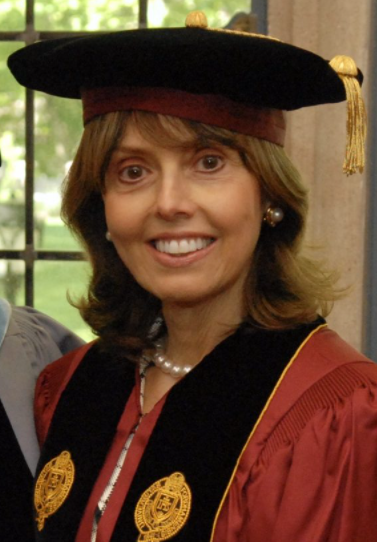
At Fordham, the students it serves tend to be Black, Latinx, first-generation, economically disadvantaged, and members of immigrant families living in the Bronx or its environs, Molina said. It has provided them with academic support, counseling, internships, scholarships, and research opportunities since 1987.
The original $2 million scholarship gift has helped 40 or 50 CSTEP students per year, providing sums ranging from a few hundred to a few thousand dollars that can make all the difference for families that have pulled together every last resource—grants, loans, scholarships—to meet their students’ costs, but who still need financial help, Molina said.
“Anything that we can help them with that helps tof ill in those gaps, that’s important,” he said. “If you come from an immigrant working class family … and you’ve got a $1,500 or $2,000 or $2,500 balance from your previous semester that you’ve got to take care of? That’s a lot of money for working class families,” he said.
With the new $2.5 million gift, the Dows’ scholarship fund could help nearly half of the approximately 270 students in the CSTEP program within a few years, Molina said.
Paying It Forward
The Christina Seix Dow College Science and Technology Entry Program Endowed Scholarship Fund is a need-based fund, with a GPA requirement, established to help CSTEP students stay at Fordham and graduate with less debt. “We hope that whatever they do, [the recipients are]they’re successful in life,” Robert Dow said. “And if they become successful financially, hopefully they’ll think about what gave them a start and pay it forward as well.”
Seix Dow has much in common with the CSTEP students she supports. She’s Puerto Rican, from the Bronx, and graduated with a bachelor’s degree in mathematics from Fordham. She was raised in a small apartment with limited resources, but, she has said, was surrounded by a loving family that developed her core values.
She became a multimillionaire bond manager, eventually forming her own investment management firm. She later founded the Christina Seix Academy, an independent school in New Jersey for underserved children. Seix Dow was among the first class of pioneering women in philanthropy at the inaugural Fordham Women’s Summit in 2017.
Preparing Students to Serve
The scholarships are a significant gift for the CSTEP students, many of whom are thousands of dollars in debt, said Renaldo D. Alba, associate director of the CSTEP and STEP programs. They not only help graduates leave Fordham in good financial health, but also prepare them to give back to their own communities.
“Our students often require graduate or professional school training, and at that level, there’s little to no financial aid. But if they’re in good [financial]health after graduation, they can take on additional loans at the next level. And if they do well and manage their loan debt as graduate students, they’re more likely to consider working in fields that may not be as lucrative in compensation, in communities that often don’t have the resources or money, because they don’t have to pay off these loans,” Alba said.
“A scholarship of this magnitude is so significant for students like these that are naturally inclined to stay in their community.”
Among the Seix Dow scholarship recipients is Leslie Abreu, a Dominican student from the Bronx who realized that Fordham was her “dream school” while attending the adjacent Fordham High School for the Arts, where she became class valedictorian.
“At one point, I was considering not going to my dream school because of finances,” said Abreu, who is enrolled in a five-year program to earn both a bachelor’s degree from Fordham College at Rose Hill and a Master of Science in Teaching from the Graduate School of Education. “Receiving help like that gives you reassurance that you are on the right path.”
Life hasn’t been easy for Abreu. Her father passed away in her senior year of high school, but he had encouraged his daughter to apply to Fordham. In her time at the University, she has advised two seventh graders in the Mentoring Latinas program, served as a peer counselor for pre-college students, and tutored middle and high school students in math as a tutor in CSTEP’s sibling STEP program for junior high and high school students. Someday, Abreu plans on following Seix Dow’s and her husband’s footsteps and paying it forward.
“[Seix Dow’s story] reassured me that that path is possible,” Abreu said. “And the fact that she has been able to help people like us shows me that I can also do that in the future.”
Learn more about Cura Personalis | For Every Fordham Student and make a gift.
If you have a question about giving to Fordham, call 212-636-6550 or send an email to [email protected].
]]>“I don’t have to be shy about what I want to ask. I don’t have to lie about my financial needs. Sometimes on campus I have to deal with cultural differences and I feel like I have to code switch, but at CSTEP, I can throw that all away and come as I am,” she said.
Reynoso is a senior in Fordham’s Collegiate Science and Technology Entry Program, known as CSTEP. The statewide program prepares minority and economically disadvantaged undergraduates for professions in areas where they are underrepresented; Fordham’s chapter, which currently serves about 250 students, is one of the largest in New York. Its counselors have helped many first-generation students find community and stay on track.
‘A Backbone Throughout My Years’
CSTEP was established at Fordham’s Rose Hill campus in the Bronx in 1987 and expanded to the Manhattan Lincoln Center campus about 15 years ago. Students benefit from multiple academic and career-oriented resources, including paid internships and research opportunities, career seminars, networking events, and support classes for pre-health courses. But one of the greatest resources, students say, is the relationship they build with their CSTEP counselors.
Fiona Sampaney was struggling with the coursework in her natural sciences major, but she couldn’t devote enough time to studying. In her free time, she said she often babysat her three younger siblings and worked as a supermarket cashier. But thanks to her CSTEP counselors, she found a solution.
“Changing majors was something I had already thought of, but I didn’t know how to go about it. They helped me draw out a two-year plan for the rest of my time at Fordham and see how a major switch would affect my GPA and academic standing for medical school,” said Sampaney, a Bronx-born first-generation student at Fordham College at Lincoln Center who plans to become a pediatrician.
Rashain Adams Jr., another first-generation student and a senior at Fordham College at Rose Hill, said CSTEP feels like a family.
“Nobody is trying to compete with you when it comes to grades or success. Everyone truly just wants you to be OK, mentally and emotionally,” said Adams, who joined CSTEP in his second semester at Fordham. “The program has been a backbone throughout my years here.”
This past spring, Gerald “Geraldo” De La Cruz, a first-generation student and a senior at the Gabelli School of Business, became a residential assistant at the Rose Hill campus. He felt stressed and isolated, thanks to pandemic restrictions. But he was able to open up to his counselor, Renaldo Alba, who also serves as CSTEP’s associate director.
“I was in a really bad place last year, mentally. I felt burnt out and drained,” De La Cruz said. “But when Renaldo starts his conversations with you, he’ll be like, ‘How are you?’ I was honest with him.”
Sometimes students just want to be heard, Alba said.
“They may just need to vent in a space that is judgement-free and confidential,” Alba said. “If you’re a first-generation student, you’re grappling with issues that parents and perhaps previous support systems cannot continue to help with.”
To help students find community and perspective, he said, counselors work to connect students to colleagues in other offices, CSTEP alumni, and peers. “Finding others in moments of isolation helps a great deal,” he said.
A Parent’s Love and Pride
For many students, feelings of isolation begin even before they stepped foot on campus, as they navigate the application process largely on their own. Once they arrive, they feel the pressure to perform—both self-imposed and from family members who don’t fully understand college life. But at the end of the day, the students say they know their parents are proud.
Adams, a history major raised by a single mother in the Bronx, said his mother loves talking about her three children: “She’s very excited that all of her kids have gone to college at this point. My brother graduated from John Jay, and he’s looking at his master’s degree. My sister just started her first year at New York University, and I’m about to graduate.”
Others had similar things to say about their families.
“My mom is the cutest. She’s a home attendant, and she tells one of her patients about me all the time. When I finish a paper or get a good grade, she’ll be like, ‘Send it to me so he can read it!’” said Reynoso, an environmental studies major who wants to improve health outcomes for urban populations, especially people of color.
De La Cruz, the son of immigrants from the Dominican Republic, said he is thankful for his family, especially his mother, a small business owner who once wanted to study psychology.
“I have an opportunity to do something that my parents couldn’t,” said De La Cruz, who wants to become a marketing executive for an entertainment company. “The sacrifices they made in life made it possible for me to do this.”
‘Lifting Myself and Those Around Me’
One of the most meaningful parts of being a first-generation college student is starting a legacy of education and generational wealth, said the students.
“I can graduate and have a higher paying job,” said Sampaney. “That provides more knowledge for not just myself, but my future children and grandchildren.”
For Reynoso, being a first-gen student also means representing others like her. Through Project TRUE, a youth development program between Fordham and the Wildlife Conservation Society, she has mentored local high schoolers who may become the first in their families to attend college, too. A good education also means personal freedom, she said.
“I can think and make decisions for myself more freely. I’m given some sort of authority to validate my opinion more, but at the same time, I’m creating space for others who may not have had the same opportunities that I have, while saying that their experiences have equal authority,” Reynoso said. “I’m lifting myself and those around me.”
]]>“Hip-Hop Biology is a class created to keep students engaged in STEM while embracing their love for hip-hop,” said Parker, an instructor at Fordham, who started using hip-hop as a teaching tool in his Fordham college-level biology classes in 2018.
One technique that Parker uses to engage his students is battle rap. Students come up with raps about course material and then compete against each other. To win a battle, Parker said, “One must have a semi-complex rhythmic flow, interesting content, and understand the culture of the audience they will be performing. Most importantly, the battle must be something the audience can react to and truly feel, even if it’s a personal story or a social issue.”
Students learn more than biology from battle rap, said Parker. Competing directly against another individual encourages students to perform better than they would if they were performing independently. The student becomes better at communicating, performing, and interacting with an audience. They also learn self-control by not reacting if someone insults them in front of others. Another critical piece is the mental health aspect, he said. Artists can discuss trauma in their lives and bring personal experience to their rap.
The class is a perfect fit for STEP, Parker said, because it gets young people excited about college. STEP is a New York state academic enrichment program designed to prepare underrepresented minority and economically disadvantaged junior high and high school students for college and careers in STEM fields (science, technology, engineering, and math) fields, health careers, and licensed professions, like accounting, law, psychology, social work among other licensed fields. Fordham’s STEP program normally takes place at the Rose Hill and Lincoln Center campuses, with some activities also taking place at local school and partner sites. The program continued throughout the pandemic when students attended virtually.
Camila Diaz Rodriguez, a student from Cathedral High School in Manhattan, called the Hip-Hop Biology course “a different experience.”
“Writing about STEM, It does help us bring together ideas and speak about topics that usually people don’t pay mind to, for example, our [rap]was on global warming,” she said.
Parker invited guest speakers to the course, like Papoose, a prolific rapper known for spreading knowledge through his rhymes. In a Q&A, the middle school and high school STEP students were able to ask Papoose advice on how to memorize rhymes and discuss STEM.
“You’ve got to know how to count your bars. You got 16 bars. Sometimes you want to say so much. And that’s the challenge for artists. How can you break it down and summarize it into 16 bars or sometimes eight bars?” He said, ” That can make you a better rapper because now, when you’re creating your rap, you’re calculating what you’re saying,” he told the students.
Parker said using hip-hop makes students feel like they are a part of something familiar. “We want this to be a space where people feel welcome, for them to be a part of it and want to be a part of it. Sometimes in these spaces, you don’t always see individuals who look or sound like you, and so if we can at least have our own sound from our own voice and sometimes bring our own people into this space, maybe we’ll feel a little more comfortable.”
]]>“It is a tragedy to lose someone so young, so gifted, and so full of promise, especially as Chad devoted his considerable gifts to the well-being of others,” Joseph M. McShane, S.J., president of Fordham, wrote in an email to the University community. “We mourn the loss of this bright light, and keep his loved ones, friends, and colleagues in our hearts during their hour of grief.”
Davis was a doctoral intern who was scheduled to complete and defend his dissertation this August and graduate with his Ph.D. in clinical psychology. He was on a full-time internship at the University of Nevada-Las Vegas, and he had recently accepted a postdoctoral position at the University of California-San Diego.
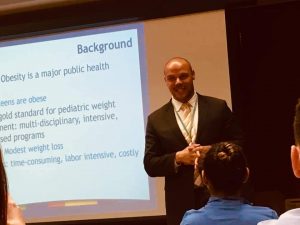
Tyler Stovall, Ph.D., dean of the Graduate School of Arts and Sciences, said the loss is felt deeply by students and faculty.
“The death of Chad Davis is a tragic and serious loss for the graduate student community at Fordham,” he said.
Davis received his bachelor’s degree in theater studies from Montclair State University and a master’s degree in clinical psychology from Fordham in 2014. Over the past 16 years, Davis touched many lives as an educator, researcher, and mentor. He served as an ESL teacher in the U.S. and abroad, a teaching/research assistant at several schools in New York, an administrator at Weill Cornell Medical College, a counselor at a California camp for overweight children and teenagers, and a volunteer at a non-profit that supported people suffering from eating disorders. As a clinical psychology extern, he counseled patients at Fordham Counseling and Psychological Services, as well as at New York University, St. Barnabas Hospital in the Bronx, and the Mount Sinai School of Medicine. Davis also founded Pipeline to the Ph.D., an initiative within Fordham Collegiate Science and Technology Entry Program (CSTEP) that provided mentorship to young psychology students of color. He wrote about his passion for mentoring undergraduate students in The Chronicle of Higher Education.
Davis stood out in his cohort of clinical psychology students, said his dissertation mentor, Mary Procidano, Ph.D., associate professor psychology. He was an energetic, engaging student with an unusual ability to integrate different perspectives in psychology to help his patients, she said. Davis wanted to better understand eating disorder-related distress, and he was especially interested in serving people from diverse backgrounds, she added.
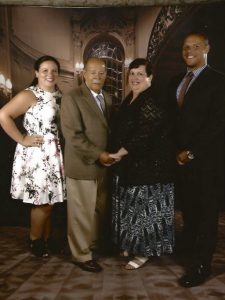
“Not only did he have a real aptitude for looking at different perspectives in psychology, but he also had training as an actor. That really added to his insight and his ability to understand and be helpful to people,” Procidano said. “We used to have many conversations about what he knew about human nature as an actor and [as a therapist], and how to put it all together. This, to me, is the essence of cura personalis—he embodied it.”
For his dissertation, Davis, who spent several years working as a professional actor and singer, surveyed more than 200 professional and aspiring performers and explored how they were affected by eating disorders and outside pressures from the entertainment industry.
Other Fordham faculty described Davis as a friend who cared deeply about his colleagues and mentees and a therapist who was dedicated to the well-being of his patients, particularly Black and Latinx individuals struggling with obesity and eating disorders.
“Chad was an absolutely wonderful, extraordinary person and rising psychologist. His smile could brighten the hardest day, and he truly cared for everyone who came his way,” said Rachel Annunziato, Ph.D., associate dean for strategic initiatives at Fordham College at Rose Hill. “He was devoted to helping others as a therapist, scholar, teacher, and to so many as a friend.”
Davis emitted so much energy and positivity in the classroom that it was easy to gravitate toward him, said another mentor.
“He was such a bright light,” said Mónica Rivera-Mindt, Ph.D., a professor of psychology who worked with Davis when she was the director of the Clinical Psychology Doctoral Program. “He had this really beautiful smile and bright eyes, and he was really funny and engaging. He’s somebody you just wanted to be around, and everyone adored him.”
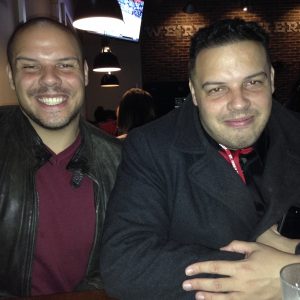
Davis overcame many obstacles to practice in a field where he would help others overcome their own trials and tribulations, said Eva Badowska, Ph.D., dean of the faculty of arts and sciences and former dean of GSAS. He was also a stalwart friend and colleague who wrestled with personal challenges while continuing to support his peers, said Rivera-Mindt.
“It was a testament to his grit, resilience, and love of helping people,” Rivera-Mindt said.
Davis was born on June 17, 1980, in West Islip, New York, to Norma Davis and Ralph S. Davis Jr. and grew up on Long Island and in New Jersey. He was a fun-loving, smart child who excelled in school, played the trumpet in his high school band, and adored the arts, said his mother, Norma. In his free time, he enjoyed singing songs from Broadway shows and working out. As an adult, he wanted to help people with eating disorders because he struggled with his own weight when he was a child. He understood the challenges of maintaining a healthy lifestyle, she said.
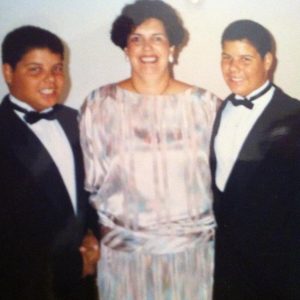
“He was very smart, very hardworking. He loved what he did, and he really wanted to help people,” Norma said. “That’s the biggest loss for us—he had so much going for him.”
But in his 40 years of life, Davis made a big impact, said Rivera-Mindt.
“We are so proud of everything that he accomplished and all the lives that he touched. He helped so many people during his short life,” said Rivera-Mindt. “And those gifts and that beautiful energy is going to live on.”
Davis is survived by his parents; three siblings—his fraternal twin brother Bryce Davis and his wife Sandy Davis, younger sister Cherise Davis, and older sister Laurie Moss; one niece; several nephews; and many cousins. Due to the pandemic, there is no immediate information yet on the burial and memorial services. This page will be updated with details as they are confirmed.
A GoFundMe site has been set up to help the family with the funeral and burial expenses.
]]>“It’s been a godsend,” Michael A. Molina, director of the CSTEP and STEP programs, said of the fund. “This money has enabled us to at least try and help students and their families.”
CSTEP is a statewide program that has provided academic support, counseling, internships, scholarships, and research opportunities to minority and economically disadvantaged undergraduates at Fordham since 1987. The CSTEP program, along with its sibling STEP program for junior high and high school students, has been a source of community for many students, especially during the pandemic.
Eight years ago, the Dow family established the Christina Seix Dow College Science and Technology Entry Program Endowed Scholarship Fund with a $2 million gift to help CSTEP students stay at Fordham and graduate from college with little to no debt. Now they are giving an additional $2.5 million to support students who remind them of themselves.
“My wife and I came from very little. For a long time, we’ve felt we’ve been fortunate, and it’s time to pay it forward or pay it back for students who may come from even more difficult situations than we had,” said Robert Dow, a former managing partner at Lord Abbett, an investment management company. “We hope that whatever they do, they’re successful in life. And if they become successful financially, hopefully they’ll think about what gave them a start and pay it forward as well.”
Seix Dow has much in common with the CSTEP students she supports. She’s Puerto Rican, from the Bronx, and graduated with a bachelor’s degree in mathematics from Fordham. She was raised in a small apartment with limited resources, but, she has said, was surrounded by a loving family that developed her core values. She became a multimillionaire bond manager, eventually forming her own investment management firm. She later founded the Christina Seix Academy, an independent school for underserved children. Seix Dow was among the first class of pioneering women in philanthropy at the inaugural Fordham Women’s Summit in 2017.
About 90 CSTEP students have benefited from the Seix Dow scholarship fund over the past seven years, including recent alumna Arnell Stewart, who delivered the student scholarship speech at the 2018 Women’s Philanthropy Summit.
These students have received significant awards from the scholarship, depending on individual need, to help pay for the full cost of tuition. Molina estimates that over the next decade, approximately 300 to 400 more students will benefit from the additional $2.5 million added to the scholarship fund.
The scholarships are a significant gift for the CSTEP students, many of whom are thousands of dollars in debt, said Renaldo D. Alba, associate director of the CSTEP and STEP programs. They not only help graduates leave Fordham in good financial health, but also prepare them to give back to their own communities.
“Our students often require graduate or professional school training, and at that level, there’s little to no financial aid. But if they’re in good [financial]health after graduation, they can take on additional loans at the next level. And if they do well and manage their loan debt as graduate students, they’re more likely to consider working in fields that may not be as lucrative in compensation, in communities that often don’t have the resources or money, because they don’t have to pay off these loans,” Alba said. “A scholarship of this magnitude is so significant for students like these that are naturally inclined to stay in their community.”
Among the Seix Dow scholarship recipients is Leslie Abreu, a Dominican student from the Bronx who realized that Fordham was her “dream school” while attending the adjacent Fordham High School for the Arts, where she became class valedictorian.
“At one point, I was considering not going to my dream school because of finances,” said Abreu, who is currently the only employed member of her immediate family. “Receiving help like that gives you reassurance that you are on the right path.”
Life hasn’t been easy for Abreu. Her father passed away in her senior year of high school, but he had encouraged his daughter to apply to Fordham. In her three years at the University, she has tutored middle and high school students in math as a STEP tutor and peer counselor for pre-college students and advised two seventh graders in the Mentoring Latinas program. Someday, Abreu plans on following Seix Dow and her husband’s footsteps and paying it forward.
“[Seix Dow’s story] reassured me that that path is possible,” said Abreu, a psychology student on the five-year teaching track. “And the fact that she has been able to help people like us shows me that I can also do that in the future.”
]]>